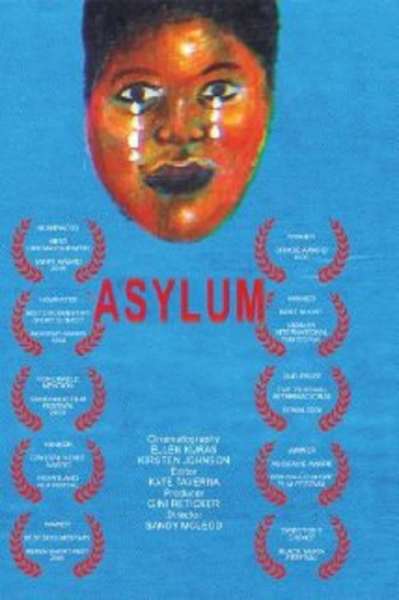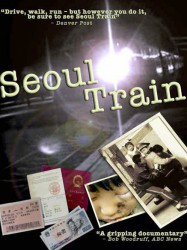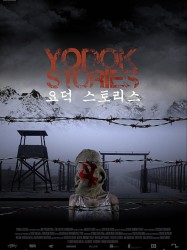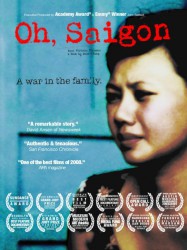Asylum est un film américain de genre Documentaire
Asylum (2003)

Si vous aimez ce film, faites-le savoir !
- Infos
- Casting
- Infos techniques
- Photos
- Vidéos
- Passages TV
- Citations
- Personnages
- Musique
- Récompenses
Asylum is a 2003 American short documentary film directed by Sandy McLeod. It was nominated for an Academy Award for Best Documentary Short.
Synopsis
A young Ghanaian woman seeks refugee status in the U.S. when her father attempts to force her to marry against her will, and undergo female genital mutilation.Commentaires
Postez un commentaire :
Suggestions de films similaires à Asylum
Il y a 8965 ayant les mêmes genres cinématographiques, 1327 films qui ont les mêmes thèmes (dont 62 films qui ont les mêmes 2 thèmes que Asylum), pour avoir au final 70 suggestions de films similaires.Si vous avez aimé Asylum, vous aimerez sûrement les films similaires suivants :

Inatteso (2005)
Réalisé par Domenico Distilo
Genres Documentaire
Thèmes L'immigration, Documentaire sur le droit
Note72%





Those who seek political asylum in Italy fear for their very survival. They are forced to wait for several years, are forbidden to work and receive no assistance from the State. They are not provided with lodging, food or information. The refugees set up communes, building shelters, squatting derelict buildings near to centres of agricultural employment and frequently move around according

Seoul Train (2004)
, 54minutesOrigine Etats-Unis
Genres Documentaire
Thèmes L'enfance, L'immigration, Documentaire sur le droit, Documentaire sur une personnalité
Note75%






Little Alien (2009)
, 1h34Réalisé par Nina Kusturica
Genres Documentaire
Thèmes L'immigration, Documentaire sur le droit, Documentaire sur une personnalité
Note67%





The protagonists are teenagers who undertake a very dangerous journey on their own, fleeing from various crisis regions of the world to Europe. Nina Kusturica conveys a complex picture of the hopes and dreams of adolescent refugees who after their getaway have to face the partly absurd and inhuman bureaucratic system of the European countries. The teenagers Juma, Hishame, Ahmed, Nura, Achmad, Asha, Jawid, and Alem deliver bit by bit insight into their situation and why leaving their home country and their families ultimately was their last resort. Beyond that, the director gives the audience a look behind the scenes, i.e. through the lenses of thermographic cameras belonging to the border police keeping track of clueless refugees, and she accompanies the teenagers to appointments with government agencies.

Yodok Stories (2008)
Genres Documentaire
Thèmes L'immigration, Documentaire sur le droit, Documentaire sur une personnalité
Note74%






Oh, Saigon (2007)
, 57minutesRéalisé par Doan Hoang
Genres Guerre, Documentaire
Thèmes La famille, L'immigration, Documentaire sur le monde des affaires, Documentaire sur le cinéma, Documentaire sur le droit, Documentaire sur la guerre, Documentaire historique, Documentaire sur une personnalité, Politique, Documentaire autobiographique
Acteurs Doan Hoang
Note75%





 , 46minutes
, 46minutesOrigine Canada
Genres Documentaire
Thèmes L'immigration, Le racisme, Documentaire sur la discrimination, Documentaire sur le droit
Filmed in Canada and China's Guangdong province, "From C to C" 《金山梦——中国与加拿大的故事》contrasts the historical injustices faced by Chinese migrants and their families over the last century with the experiences of contemporary Chinese Canadian youth who embody diverse, transnational identities across Canada today. With interviews in four languages—Cantonese, Mandarin, Taishanese and English—the film conveys the impact of the historical Head Tax and Exclusion Act (1923 - 1947) imposed on Chinese immigrants to Canada. The film features interviews with Chinese Canadian veterans George Chow and Frank Wong and 104-year-old head tax redress activist Charlie Quan.

Molly & Mobarak (2004)
, 1h25Genres Documentaire
Thèmes L'immigration, La mer, Transport, Documentaire sur le droit, Documentaire sur une personnalité
Note11%






المنام (1987)
, 45minutesRéalisé par Mohamed Malas
Genres Documentaire
Thèmes Afrique post-coloniale, L'immigration, Religion, Documentaire sur le droit, Documentaire sur la guerre, Documentaire historique, Documentaire sur une personnalité, Documentaire sur la religion, Politique, Religion juive
Note62%





The film was composed of several interviews with different Palestinian refugees including children, women, old people, and militants from the refugee camps in Lebanon. In the interviews Malas questions his subjects about their dreams at night. Through their answers, the film attempts to reveal the underlying subconsciousness of the Palestinian refugee. The dreams always converge on Palestine; a woman recounts her dreams about winning the war; a fedai of bombardment and martyrdom; and one man tells of a dream where he meets and is ignored by Gulf emirs. According to Rebecca Porteous, the film constructs "the psychology of dispossession; the daily reality behind those slogans of nationhood, freedom, land and resistance, for people who have lost all of these things, except their recourse to the last.

De Nadie (2005)
, 1h22Genres Documentaire
Thèmes L'immigration, Documentaire sur le droit, Documentaire sur une personnalité
Note74%






Harga (2010)
, 27minutesOrigine France
Genres Documentaire
Thèmes L'immigration, Documentaire sur le droit, Documentaire sur une personnalité
Hichem rêvait de « harga » depuis tout petit. Un jour, il a pris la mer vers l'Europe, il a tenté le grand voyage interdit, sur un bateau de fortune avec 27 concitoyens, dont certains étaient des amis ; seul Hichem est revenu. D'autres Tunisiens racontent, de leur côté, pourquoi ils ont voulu ou voudraient quitter le pays : la misère, le chômage, l'impossibilité de se projeter dans l'avenir, l'impasse dans laquelle ils se trouvent.
 Connexion
Connexion